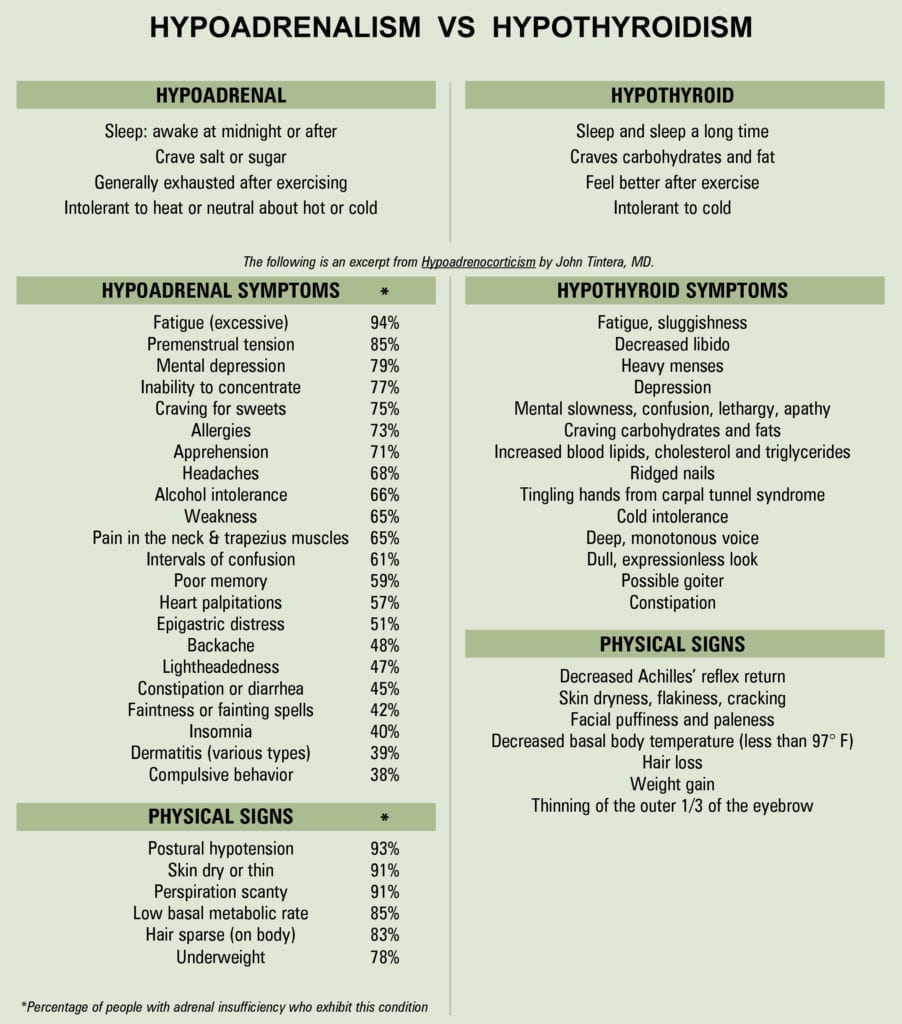The Adrenals and Adrenal Fatigue
Hormones of the Adrenal Cortex
The adrenal cortex consists of three different regions, with each region producing a different group or type of hormones. Chemically, all the cortical hormones are considered steroids.
- Mineralocorticoids are secreted by the outermost region. The principal mineralocorticoid is aldosterone, which acts to conserve sodium ions and water in the body.
- Glucocorticoids are secreted by the middle region. The principal glucocorticoid is cortisol, which increases blood glucose levels.
- Gonadocorticoids, or sex hormones, are secreted by the innermost region.
Male androgen hormones and female estrogen hormones are secreted in minimal amounts in both sexes by the adrenal cortex, but their effect is usually masked by the hormones from the testes and ovaries. In females, the masculinization effect of androgen secretion may become evident after menopause, when estrogen levels from the ovaries decrease.
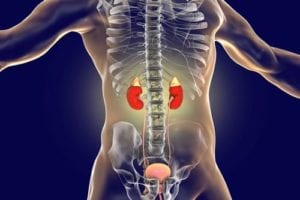
Hormones of the Adrenal Medulla
The adrenal medulla develops from neural tissue and secretes two hormones, epinephrine and norepinephrine. These two hormones are secreted in response to stimulation by sympathetic nerve, particularly during stressful situations. A lack of hormones from the adrenal medulla produces no significant effects. Hypersecretion, usually from a tumor, causes prolonged or continual sympathetic responses.
Do You Have Adrenal Fatigue?
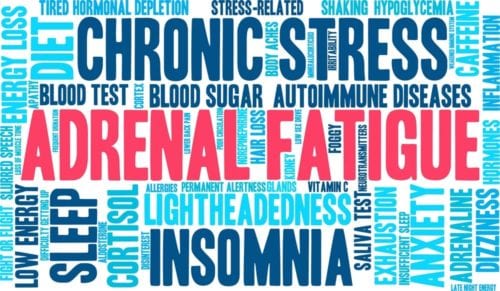
Your two adrenal glands are small, triangular-shaped endocrine glands located on the top of each kidney. Each adrenal gland is approximately 3 inches wide, and a half inch high.
Each gland is divided into an outer cortex and an inner medulla. The cortex and medulla of the adrenal gland secretes different hormones. The adrenal cortex is essential to life, but the medulla may be removed with no life-threatening effects.
When the adrenal glands are not functioning optimally, you can have a condition that is known as adrenal fatigue, or adrenal exhaustion. Adrenal fatigue often develops after periods of intense or lengthy physical or emotional stress, when over stimulation if the glands leave them unable to meet your body’s needs.
Some other names for the syndrome include non-Addison’s hypoadrenia, sub-clinical hypoadrenia, hypoadrenalism, and neurasthenia.
Symptoms of Adrenal Fatigue
- Excessive fatigue and exhaustion
- Non-refreshing sleep (you get sufficient hours of sleep, but wake fatigued)
- Overwhelmed by or unable to cope with stressors
- Feeling rundown or overwhelmed
- Craving salty and sweet foods
- You feel most energetic in the evening
- A feeling of not being restored after a full night’s sleep or having sleep disturbances
- Low stamina, slow to recover from exercise
- Slow to recover from injury, illness or stress
- Difficulty concentrating, brain fog
- Poor digestion
- Low immune function
- Premenstrual syndrome or difficulties that develop during menopause
- Consistent low blood pressure
- Extreme sensitivity to cold
Adrenal vs Thyroid Issues
How Adrenal Disorders Can Disguise Themselves as Thyroid Disease
Understanding the Basics of Hypothyroidism
According to the American Thyroid Association, hypothyroidism is a condition in which the thyroid gland does not make enough thyroid hormone and, just like other hormone deficiencies, it can affect almost every aspect of your well-being. It can make you feel weak and fatigued, cause unordinary weight gain, and can lead to even more serious health concerns in left untreated.
What Causes Hypothyroidism?
With hypothyroidism being such an all-encompassing disease, it is often hard for us to pinpoint the exact root of the problem. The range of things that have been shown to cause low thyroid hormone levels are blood sugar imbalances, poor gastrointestinal health (aka gut health), and even elevated stress levels caused by the adrenal glands. Thyroid diseases can even be caused by separate diseases all together such as the case with Hashimoto’s disease.
According to WebMD, “Hashimoto’s thyroiditis is an autoimmune disease, a disorder in which the immune system turns against the body’s own tissues. In people with Hashimoto’s, the immune system attacks the thyroid. This can lead to hypothyroidism, a condition in which the thyroid does not make enough hormones for the body’s needs.”
Due to the complex nature of hypothyroidism we will shift to one portion of the cause of this disease and focus solely on the role that the adrenal glands, stress and cortisol levels play in hypothyroidism.
Since the endocrine system is devised of glands that produce and send hormones to all areas of our body to regulate the essential functions of our body, such as temperature, reproduction, growth, immunity, and aging, it is understandable that this should be the hub of vitality, longevity and well-being. Many individuals are getting remarkable results from having their hormones optimized. Specialized hormonal testing can be utilized to bring the hormones into optimal ranges.
Understanding the Adrenal Glands and Stress
The Adrenal Glands
Stress is stress whether it is emotional vs physical or short-term vs chronic. Your body reacts to stress in much of the same way regardless of the source or duration of the stress induced. The National Institute of Mental Health describes stress as, “the brain’s response to any demand.”
These demands cause your adrenal glands to fire out adrenaline and cortisol, which are also the hormones associated with the ‘flight-or-fight’ response you learned about in school. These two adrenal hormones are described by the Mayo Clinic as, “Adrenaline increases your heart rate, elevates your blood pressure and boosts energy supplies. Cortisol, the primary stress hormone, increases sugars (glucose) in the bloodstream, enhances your brain’s use of glucose and increases the availability of substances that repair tissues.”
This response worked great when we either had to outrun predators or conserve our energy during harsh winter conditions. Yet in today’s world of rest and relaxation it can cause unhealthy responses, especially when these stressors are chronic ones such as work or financial worries.
Stress and Its Effect on Health
Obvious daily stressors, like described above, are not the only factors to consider when thinking about stressing the body. Even internal happenings like sharp changes in blood sugar levels, allergies and ordinary inflammation can alert your adrenals to secrete more stress hormones. Stress can be anything that disrupts your body’s natural balance.
Even though dysfunction of the adrenal glands due to stress is so common today, adrenal disorders are often missed by because the symptoms are so broad and mirror other problems or disorders. Adrenal problems are often not even tested for because these hormones play a role in every system in the body and it will hide behind other systems that it is affecting, such as menopause or food sensitivities.
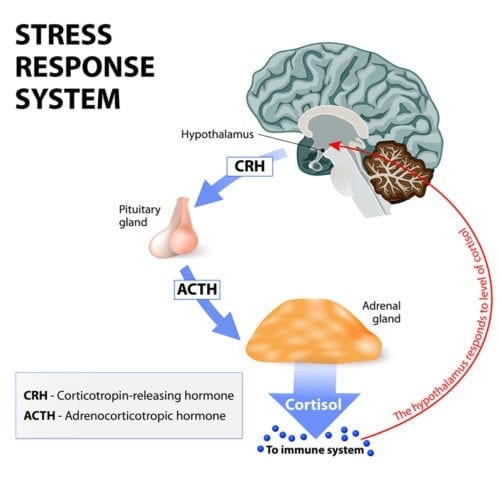
You should consult with a Specialist if you are experiencing one or more of these problems caused by Adrenal Stress:
- Fatigue
- Headaches
- Decreased immunity
- Difficulty falling asleep, staying asleep and waking up
- Mood swings
- Sugar and caffeine cravings
- Irritability or light-headedness between meals
- Eating to relieve fatigue
- Dizziness when moving from sitting or lying to standing
- Gastric ulcers
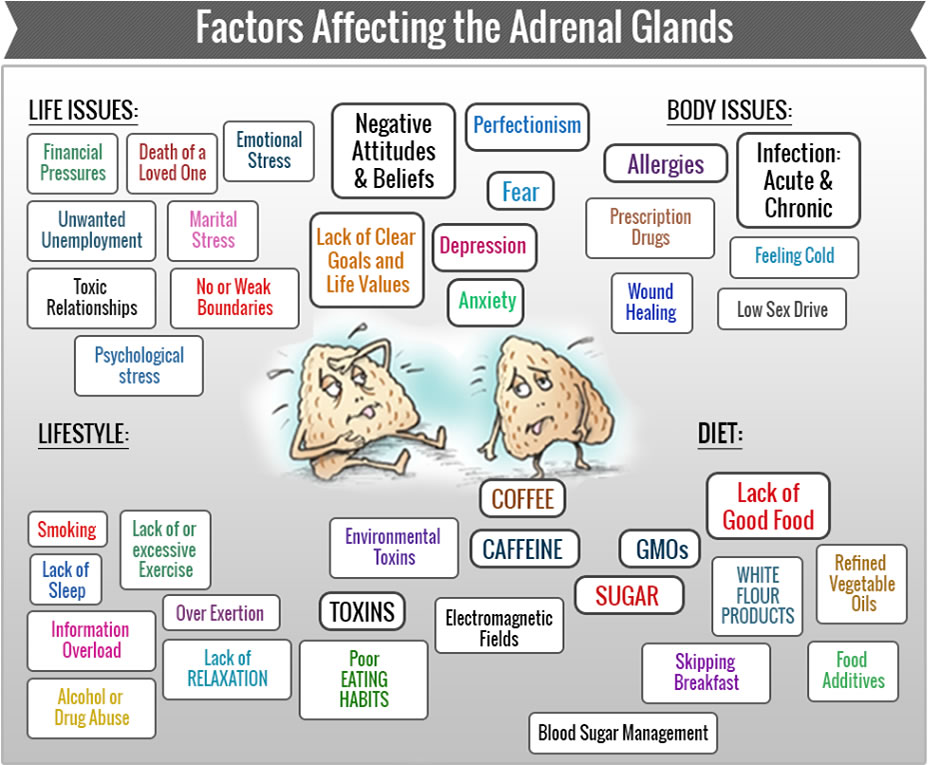
How Adrenal Glands Can Disrupt the Function of Thyroid Hormones
Thyroid function effects good majority of bodily functions too, just as most hormones in your body do. Symptoms of hypothyroidism can even be spurred about be weak adrenal function, just as Hashimoto’s disease can cause adrenal fatigue. In cases where adrenal problems lead to thyroid disorders, it is pointless to treat your thyroid without first fixing your adrenal glands. Sometimes, fixing your adrenal glands can even correct the thyroid function itself. Cure the problem at its root, not the symptoms.
The greatest way that your adrenals indirectly effect your thyroid’s functions is because of the impact they have on your blood sugar levels. Increases or decreases in the amount of cortisol produced by your adrenal glands can cause your blood levels to rise or fall drastically. This can lead to becoming either hypoglycemic or hyperglycemic. Blood sugar imbalances have been shown to cause numerous symptoms of hypothyroidism in some studies, such as this study published be the American Diabetes Association.
Stress, The HPA Axis and Adrenal Gland
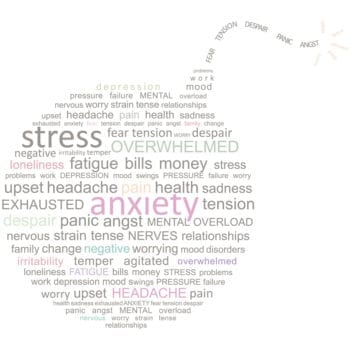
Apart from regulating your body’s reaction to stress, your adrenal glands are part of a complex system that regulate things like temperature, mood, sexual function, digestion, immune system, and energy consumption. Together your adrenals, hypothalamus and pituitary glands make up your HPA axis. If one of any of these three areas becomes imbalances, any of the functions listed above can be deeply impacted.
There have been numerous studies to show the exact impacts that prolonged adrenal stress on the HPA. Since your hypothalamic-pituitary-adrenal axis is composed of organs that regulate the production of thyroid hormones, if it becomes altered then so will the secretion of your thyroid hormones.
There have been numerous studies done to show that the chemicals released during stressful events suppress your HPA, and in turn, reduce the levels of thyroid stimulating hormone (TSH) in your system. TSH causes the thyroid gland to make two hormones: triiodothyronine (T3) and thyroxine (T4). T3 and T4 help control your body’s metabolism. So, if your HPA function decreases, your TSH levels will drop, causing T3 & T4 levels and your metabolism to decrease.
How Adrenal Glands can Disrupt the Function of Thyroid Hormones
The immune system can be just as complex as the HPA axis and is regulated primarily by another 3 factors, the gastrointestinal tract, the lungs, and the blood-brain barrier. Together, they inhibit toxic and external materials from making their way into your blood and brain. Studies, like this one first published in 2006, show that stress weakens your these barriers making your immune system much more susceptible to foreign substances.
It is best to think of these three things as your first line of defense against harmful substances. When they become weak, your body becomes vulnerable to antigens and proteins passing into parts of the body where they do not belong. If your immune system functions at a low level for an extended period and this continuously happens again and again, the system becomes compromised all together and you can develop autoimmune diseases, such as the “thyroid” disorder Hashimoto’s disease.
Reduced Thyroid Conversion Due to Adrenal Stress
It is important to understand the relationship that T3 and T4 play in your body. Although both are produced by the thyroid gland, 93% of the thyroids production is dedicated to secreting T4. T4 is an inactive form of thyroid hormone that must be converted to T3 to be used by your cells. Inflammatory cytokines both disrupt the HPA axis but also obstruct the conversion of unusable T4 to usable T3.
This is what Endocrine Web has to say about the T3-T4 connection, “T3 and T4 control your body’s metabolism. If you don’t have enough of them, then your metabolism slows down. Your metabolic rate dictates how quickly you process food, how fast your heart beats, how much heat your body creates—and even how quickly you can think. In essence, T3 and T4 are in charge of how your body uses energy. T3 and T4 are not equal in strength. T3 is the more active hormone of the two.”
Chronic Stress Inhibits Your Cells’ Thyroid Hormone Receptors
You can have all the T3 and T4 circulating in your bloodstream in the world, but it will do nothing if it doesn’t first activate receptors on your cells. The same inflammatory cytokines mentioned above can cause the sensitivity of your cells’ hormone receptors to greatly diminish, including their thyroid receptors.
This may be easier to understand for those who have, or know someone close, who suffers from insulin resistance. In these individuals, their cells progressively lose sensitivity to insulin. The National Diabetes Information Clearinghouse (NDIC) describes insulin resistance as, “Insulin resistance is a condition in which the body produces insulin but does not use it effectively.” Adrenal stress can cause your cells to not use the thyroid hormones, such as T3 and T4, efficiently in much the same way. You can have plenty of thyroid hormones in your body, but your cells will never become triggered to let them in to do their job and they are left floating around aimlessly. Therefore, it is often best to get the active amount of “free” T3 and “free” T4 in your body tested instead of the total amount of T3 and T4 you produce.
Although there is no real, logical way for you to have your thyroid receptors checked, research suggests they are diminished by autoimmune diseases and other inflammatory conditions. That is why a patient with Hashimoto’s disease can undergo thyroid replacement therapy and still endure the symptoms of the disease itself. For these people, inflammation weakens the thyroid receptor site sensitivity so even though they have normal levels of thyroid hormones in their blood, such as TSH, T3 and T4, they still get the symptoms of hypothyroidism. Again, this is the reason you want to get your “free” thyroid hormone levels checked and possibly even “reverse” T3 and T4 levels.
Long-Term Stress Can Lead to Other Hormonal Imbalances
Cortisol is one of those hormones your adrenals secrete during a stress filled event. Stress is stress and can be anything from inflammation, to financial worries, to physical stress. When your body secretes high levels of cortisol for extended periods of time, your liver functions at a lower level and its ability to clear excess estrogen from your body is diminished.
Studies, such as this one published by the Journal of Thyroid in 2011, show that a surplus of estrogen in your system increases the level of thyroid binding globulin (TBG). TBG is a circulating protein that reversibly binds triiodothyronine (T3) and thyroxine (T4) and carries them in the bloodstream. An increase in TBG may result in an increase in total T4 and T3 without an increase in hormone activity in the body. If additional thyroid hormone testing is indicative of hypo- or hyperthyroidism without any symptoms, TBG levels become more relevant. TBG levels can artificially suggest states of hypothyroidism or hyperthyroidism. Various nonthyroidal illnesses, medications, high estrogen states, and even prematurity can mimic hypothyroidism as a result of misleading laboratory findings. Increased TBG levels may be due to hypothyroidism, liver disease, and pregnancy. Decreased TBG levels may be due to hyperthyroidism, renal disease, liver disease, severe systemic illness, Cushing syndrome, medications, and malnutrition. Thus, the entire laboratory data collection evaluating thyroid function should be considered along with the current state of health.
When TBG levels become too elevated, the percentage of the active form of free T3 and free T4 decline. Having low free T3, free T4 and T3 uptake on a lab test can indicate high levels of thyroid binding globulin in your system, especially if your total T3 and total T4 levels appear to be somewhat normal.
Other common culprits to elevated TBG levels are birth control pills and estrogen replacement therapy. If you are taking either of these medications and are experiencing symptoms on hypothyroidism, it is important to have to proper blood work evaluated to determine the risks and rewards of continuing treatment or the possibility of alternative medical treatment options.
How to Bring your Adrenals Back into Balance
One would assume with this knowledge of how adrenal stress can hide behind thyroidism, the problem would be easy to fix but that is not necessarily the case. Much like how adrenal issues can be the root of other issues in your body, other issues in your body are often the underlying root of excess adrenal stress. This can be any range of different things from anemia, to mineral deficiencies, to toxins in the environment, and of course, chronic stress and inflammation.
Without correcting these affairs in your body, any effort to support the adrenal glands directly will be insufficient and unsuccessful. With that in mind, here are some guiding principles to promote the health of your adrenals:
- Cut out foods that cause inflammation, especially refined flours, high-fructose corn syrup and industrial seed oil
Eat a diet that consists of a lot of wild cold-water fish or supplement with a high-quality fish oil that contains the sufficient amount of the Omega-3 fatty acids DHA & EPA - Stabilize blood sugar levels by consuming less carbohydrates
- Avoid caffeine, tobacco and other stimulants all together or at least as much as possible
- Practice stress management and relaxation techniques (i.e. deep breathing exercises and meditation techniques)
- Don’t hesitate to enjoy life, have fun and laugh as much as possible!
Certain dietary supplements such as phosphatidyl serine and ginseng have been shown to support the adrenals and improve your body’s ability to deal with stress. Remember though, as with all dietary supplements and medications, you should not take these things without the supervision of a trained medical professional.


